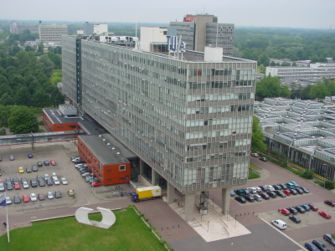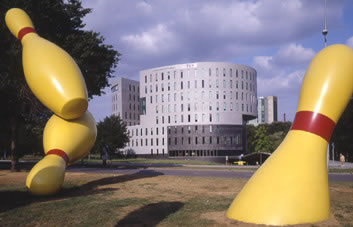Eindhoven University of Technology
The Technische Universiteit Eindhoven (TU/e) in brief
There have been many changes since it was established in 1956 as a Technische Hogeschool (Technical College). The university now has 9 departments and provides 11 Bachelor’s degree programs, 1 special
Bachelor's program, 18 Master’s degree programs, 8 special Master’s programs, 4 educational Master's programs (mathematics, physics, chemistry and computer science), 8 post-doctoral programs for technological designers (Professional Doctorate in Engineering, PDEng) and various post-doctoral courses and programs (Doctor of Philosophy, PhD).
In 2005 the TU/e has around 3000 employees, 240 professors, 7200 students, 250 PDEng students, 600 PhD students, 25,000 graduate engineers, 1000 graduate technological designers and 2000 PhDs. There are some 100 students’ associations (social, sports, cultural and study-related) and 15 associations for graduates.
The TU/e has established a partnership with the Delft University of Technology and the University of Twente in the form of a Federation of Universities of Technology in the Netherlands which is at present being established. These three universities of technology are an important knowledge partner for industry and government in the field of advanced technology. They have an excellent scientific starting point among the top 20 European universities – with TU/e holding the number three position – and have a strong focus on the development and commercial application of knowledge. This partnership will be intensified in the coming years, and will initially promote the flow of students between the three universities from the bachelor’s to the Master’s programs. Together they will form the 3TU Graduate School in the field of Master’s programs, the Institute of Science and Technology in the field of research, and the 3TU Innovation Lab in the field of commercialization of knowledge.
The TU/e is the commissioner of ten research schools recognized by the Royal Netherlands Academy of Arts and Sciences, as well as two of the six top research schools in the Netherlands and one of the four top technological institutes.
The TU/e forms part of the European CESAER, Santander and CLUSTER university networks, and has partnerships with universities around the world.
Technology Management
The TU/e's Technology Management department offers two master's study programs and is involved in various other education programs. Employees also carry out strategic technological research for industry and other applications.
 Technology Management encompasses all activities that are needed to achieve the maximum yield from technological developments in a socially responsible manner. This is the only way to ensure that technological developments are cost-effective in the long term.
Technology Management encompasses all activities that are needed to achieve the maximum yield from technological developments in a socially responsible manner. This is the only way to ensure that technological developments are cost-effective in the long term.
Technology Management has two sides to it. On the one hand it is concerned with organizing technical product chains for products or services, both within companies and other organizations, and within the networks of those organizations. It is not only production and distribution that play a role here, but aspects such as marketing, design and innovation, purchasing, storage, sales, maintenance and service. On the other hand 'technology management' means that, right at the beginning of the development and production processes, we can take into account the risks for the environment and our living conditions, the long-term consequences for society, and the perception and needs of consumers, both in the western world and in developing countries. Policies can be developed on a regional, national and international level based on our expectations about the acceptance of technology.
Topics of special interest
Important topics in education and research at the Technology Management department are:
- operations management and logistics
- integral quality control
- chain management and network control
- innovation management policy
- human-system-interaction
- information and communication technology
- internationalisation
- technology for a sustainable development.
Some figures
The Technology Management department has:
- 300 employees, including 50 professors (full or part-time)
- almost 4000 graduate engineers
- every year more than 500 internships, subjects for graduation projects and design commissions
- every year in excess of 150 exchanges and research assignments with and in foreign countries




